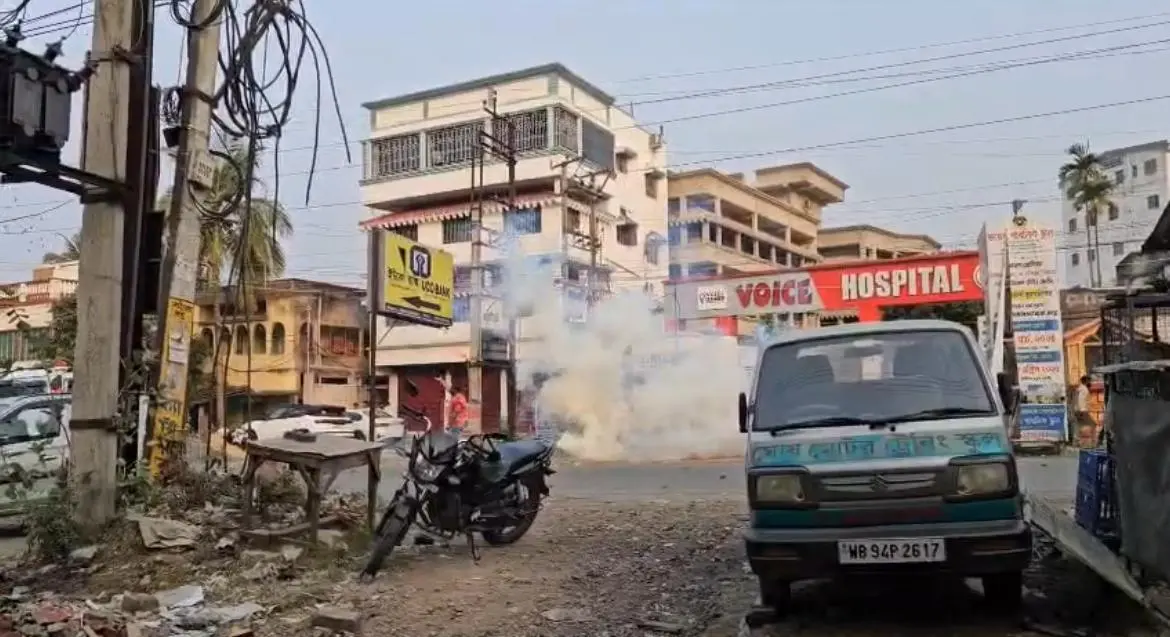Murshidabad, West Bengal: Jangipur remained under a tense atmosphere on Wednesday, following significant violence that erupted yesterday afternoon fueled by opposition to the amended Waqf Act. While police report the immediate situation is under control, the imposition of strict security measures, including a regional internet shutdown and prohibitory orders under Section 163, highlights the fragility of peace in the Murshidabad district town.
Roots of the Unrest: Waqf Act Protests Ignite
The disturbances were sparked on Tuesday afternoon when demonstrators, identified primarily as members of minority student and youth organisations, gathered to protest recent changes to the Waqf Act. The specific nature of the amendments causing the dissent wasn’t immediately detailed, but the opposition was strong enough to mobilize significant numbers, rapidly escalating from a protest gathering to direct action.
Highway Blockade Paralyzes Key Route
The protesting groups strategically blocked National Highway 12, a vital artery connecting North and South Bengal, focusing their efforts on the stretch between Omarpur and Dhuliyan Bazaar. This move caused widespread disruption, bringing vehicular movement to a standstill for hours. The blockade significantly impacted commuters and commerce, and critically, impeded emergency services, with reports confirming that ambulances were among the vehicles left stranded.
Violent Confrontations Erupt
Attempts by law enforcement to clear the highway blockade led to direct and violent confrontations. According to police statements, officers faced resistance involving heavy stone-pelting from the assembled crowd. The situation deteriorated rapidly, culminating in the alleged torching of at least two police vehicles. Authorities responded with standard crowd dispersal techniques, including the use of tear gas shells and lathi charges, leading to injuries among both protesters and police personnel.
Authorities Impose Strict Curbs
In a bid to prevent further violence and curtail the spread of potentially inflammatory rumours or coordinated actions, authorities enacted stringent measures late Tuesday and continuing into Wednesday. Internet services across Jangipur and surrounding areas were suspended indefinitely. Furthermore, Section 163 of the CrPC was invoked, effective until April 10th, prohibiting any gathering of five or more individuals. This order explicitly bans carrying items deemed potential weapons, such as sticks, or flammable substances like petrol and kerosene. It also forbids provocative speeches and the dissemination of unverified information.
Political Ripples and Reactions
The incident has drawn responses from across the political spectrum. Humayun Kabir, the local Trinamool Congress MLA, cancelled a planned visit, expressing concern his presence might aggravate tensions. While condemning the violence as “hooliganism” and unacceptable attacks on police, he acknowledged the protesters’ underlying issue, stating he personally supports a Supreme Court review petition against the amended Act.
West Bengal Governor C.V. Ananda Bose registered deep concern over the outbreak of violence, issuing a statement asserting that such actions “cannot be tolerated.” He lauded the state administration’s recent peaceful management of Ram Navami festivities and called for decisive action against any attempts to disrupt communal harmony.
Conversely, former MP and current Congress leader Adhir Ranjan Chowdhury placed blame on the police, suggesting excessive force was applied during the clashes and controversially raising the possibility of deploying the military to ensure peace.
Current Situation: Uneasy Calm Under Heavy Security
As of Wednesday morning, Jangipur presents a picture of uneasy calm. National Highway 12 has been reopened, restoring traffic flow. However, a heavy police and paramilitary presence remains palpable, with additional forces deployed and security pickets established throughout the town. Police officials maintain the situation is currently “under control,” but the ongoing restrictions and visible security apparatus reflect official concerns about potential flare-ups. Investigations are actively proceeding, with police confirming damage to their vehicles and injuries to personnel. Legal action has been initiated against those suspected of involvement in the rioting and spreading misinformation.
Looking Ahead: Legal Battles and Appeals for Peace
The local conflict unfolds against the backdrop of a larger legal challenge to the amended Waqf Act itself, with the Supreme Court scheduled to hear a related petition on April 12th. Meanwhile, authorities are making public appeals, urging Jangipur residents to maintain calm, cooperate with law enforcement, and critically, to ignore and refrain from spreading rumours. The focus remains squarely on preventing any resurgence of violence and restoring lasting normalcy to the region.


